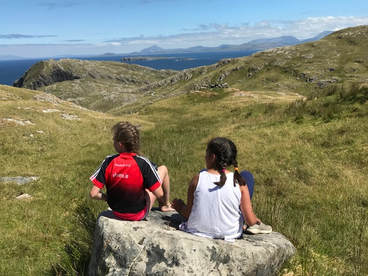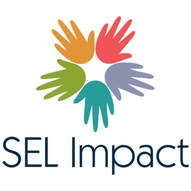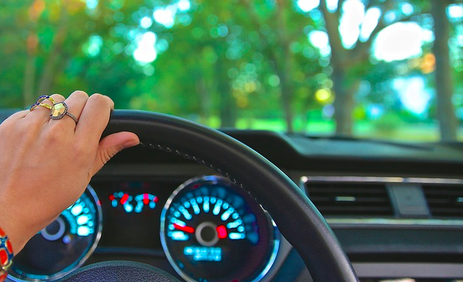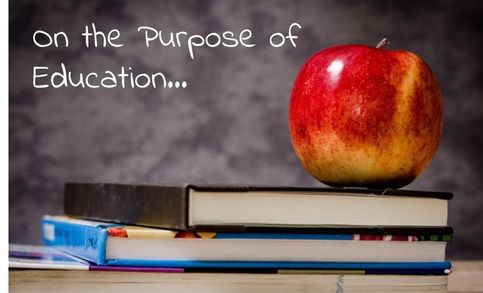|
How much time do you spend alone in your car on any given day? A typical day in my world consists of driving to and from work, dropping kids off and picking them up, random trips to the store, etc. I would estimate that on average I spend at least an hour alone in my car each day. Sixty minutes a day, five hours a week, twenty hours a month, two hundred and forty hours a year... That's a lot of time!
Why am I writing about how much time I spend in the car? Well, simply put, in most cases, I don't remember a thing about that time. Thanks to neuron superhighways we just shift into autopilot and somehow get from point A to point B without much thought at all. That's right, just crank up the tunes, NPR, or dial up a friend, and you are mindlessly on your way. In a quest to become more mindful, I am determined to find ways to incorporate mindfulness in my daily routine. Being mindful in the hustle and bustle of a world buzzing with distraction is becoming ever more elusive. Or is it? I discovered that the perfect opportunity to practice mindfulness has been right in front of me all along... Just last week, I made a resolution to "tune out" in order to "tune in". Brilliant! No new gym memberships, yoga classes, or Youtube videos, just monopolizing these precious moments of time alone in the car to practice mindfulness. By turning the radio off, I was tuning out of other people's stories and "tuning in" to my own story. While this may seem like a simple maneuver, it proved to be an esoteric undertaking. Being so accustomed to the distraction of music, talk, and the overall soundtrack of life, the minute I turned the radio off, I was confronted by an awkward silence that permeated the space. As if on cue, the monologue of my thoughts became loud and clear. It was as if the voice in my head was centerstage, illuminated by a high beam spotlight. To say I felt a bit strange at first would be a complete understatement. When is the last time you were a captive audience to your own thoughts? As I continued to notice my thoughts, I found that I was actually enjoying the experience of witnessing my mind's improv show. It was curiously entertaining and eminently insightful. As a strong advocate for Social Emotional Learning (SEL), I find that designating time to practice Mindfulness not only deepens our Self-Awareness, but also informs and improves our Self-Management skills. The biggest obstacles in my practice of mindfulness have always been the logistics of time and space. Problem solved! Making the conscious decision to "tune out" for a period of time and "tune in" to my thoughts and feelings reinforced the importance of noticing what I am thinking, self-awareness, and feeling connected. For the time being, I find myself glued to the practice and as such, I invite you all to challenge yourselves to "tune out" to "tune in".
0 Comments
Over the last couple of days the Midwest experienced some of the coldest temperatures ever recorded, including air temperatures of -23, and wind chills as low as -47 degrees. These extreme conditions forced many of us to stay indoors and avoid exposure to the dangerously brutal conditions. While I have just described what seems to be a dreadful situation, I have decided to dedicate this blog to the silver lining of the Polar Vortex.
Tuesday evening through Friday morning, I was reminded of what this life is all about, family. In the hustle and bustle of the daily grind of 21st century living, it is rare, if not an anomaly, to have everyone home with absolutely nothing to do and nowhere to be except together. Staying in pajamas all day long, extended mornings fueled by hot coffee, pancakes, and snuggling, were nothing short of delightful. Afternoons occupied by binge watching Netflix, at home yoga sessions, and simply enjoying the absence of a schedule nourished our collective soul. Evenings took on a whole new feel in that we were not rushing around or stressing to prepare for the next day. We were able to just simply enjoy the moment. On Wednesday evening, our neighbors braved the cold and joined us for an impromptu "Polar Vortex Bash" complete with a smorgasbord potluck and boardgames. We ate, drank, laughed, relaxed, and enjoyed the unexpected mid-week gathering. The gift of togetherness doesn't occur nearly as much as it should with all the demands of modern life. When did life get so busy? Work life balance proves to be a constant challenge in households with two working parents and our 24 hour accessibility via technology. Clearly this post is not intended to bash technology, but to highlight and celebrate days that require us to press pause, take a time out and to reconnect with our innermost circle, our family. Thanks to the Polar Vortex, the demands and distractions of the outside world were shut out and kept at bay for a couple of days. Our focus was on each other and the beauty and warmth generated by togetherness. So for all of you who may have jumped to the conclusion that this bitter cold blast of arctic air must have been awful, think again. Thanks to the Polar Vortex our family was able to reconnect, recharge, and realign while being reminded what this life is all about. What is the purpose of education? This week, I have chosen to visit the foundational question in education, one that I believe should be revisited more often. In a world that has gotten so caught up in "common core" curriculum, standardized testing, and rigorous academic expectations, it is important to go back to the basics and ask ourselves, what are we doing? And why are we doing it? What do we want our kids to gain from their educational experience? Put simply, what is the purpose of education? Not only does the answer to this question directly impact the social, emotional, and academic well-being of our students, staff, and community at large, it is indicative of the future of our civilization, and the values of our society as a whole. This question merits continuous reflection as it manifests itself in the cornerstone of our identity as a nation, how we are shaping our young, and how we are preparing them to live and lead in the future. The following quotes reveal what some of the past and present leaders in the educational arena have to say about the purpose of education. John Dewey postulated, “The purpose of education has always been to every one, in essence, the same—to give the young the things they need in order to develop in an orderly, sequential way into members of society" (1934). According to the great Dr. Martin Luther King Jr., “We must remember that intelligence is not enough. Intelligence plus character—that is the goal of true education” (1948). Educator and philosopher, Mortimore Adler, stated the purpose of education is, "The development of citizenship, personal growth or self-improvement, and occupational preparation" (1982). Timothy Shriver and Jennifer Buffett wrote, "The purpose of education is to invite students to become engaged with great ideas and experiences that can in turn help them discover their own great ideas and purpose" (2015). Sir Ken Robinson stated, "Education is a system in the sense that it’s organized on a grand scale, but it manifests itself every day in the actions and reactions of living people...It manifests itself as relationships and feelings and achievements" (2018). As you have read, the purpose of education has evolved over the years. From Dewey's practical promulgation of the orderly, sequential development of members of society, to the incorporation of character by Dr. Martin Luther King Jr., to the incorporation of personal growth and self-improvement by Adler, to the exposure to great ideas that in turn spark discovery of ones' own great ideas and overall purpose, to Sir Ken Robinson's idea that the system of education is defined by the day to day actions, reactions and relationships of all stakeholders. The integration and evolution of social and emotional character development has given new breath and depth to purpose of education. As a major proponent and advocate of SEL, I believe the purpose of education is a blend of all the above mentioned responses. We must not overlook the "uncommon" core of SEL while so intently focusing on the "common" core. Students must be taught the SEL competency of Self-Awareness so that they may discover who they are at their very core, and use that knowledge to achieve self-actualization. In closing, one thing is certain, the collaboration of schools, families, and communities is a pivotal factor in the development of a healthy and just society. I will venture to say that perhaps more important than defining what is deemed the "correct" answer to the question, is the rich conversation that results from asking it.  Relationships are defined as the way in which concepts, things, or people are connected. For the purpose of today's blog, there are two types of relationships that I will dote upon; relation to self, and relation to others. How we approach and navigate new relationships, and how we manage, nurture and grow our existing relationships says a lot about who we are as human beings. Before going any further in this post, keep these two words in mind: Relationships matter! Relationships have to do with our regard and behavior toward ourselves and one another. Let's begin by examining our relationship with ourselves. Next time you look in the mirror, tune in to the thoughts that are going through your mind. What do you say to yourself about the reflection looking back at you? Do you look at yourself with a critical eye? Are you judgmentally focusing on flaws that you perceive? Or are you looking upon yourself with loving confidence, kind compliments, thoughts of gratitude and acceptance? Author and journalist, Sidney J. Harris, writes, "It's surprising how many people go through life without ever recognizing that their feelings toward other people are largely determined by their feelings toward themselves, and if you're not comfortable within yourself, you can't be comfortable with others." Here is where the Self-Awareness piece plays an essential role in our relationships with self and others. In order to have healthy relationships with others, we must start with a healthy relationship with ourselves. Sounds simple, right? The truth of the matter is that it is simple once you commit to tending to yourself by allowing yourself to indulge in Self-Care. Self-Care enables connection with ourselves in ways that nurture our very core and in turn make us more available to connect with others? Much like the oxygen masks on an airplane, secure your own before helping others. So do yourself a favor, and nourish your mind, body, and soul with a little daily dose of Self-Care. Here are my favorite "Self-Care" ideas lists by Ellen Bard broken into 3 sections of simple ways to nourish your mind, body, and soul. Tiny Self-Care Ideas for the Mind 1. Start a compliments file. Document the great things people say about you to read later. 2. Scratch off a lurker on your to-do list, something that’s been there for ages and you'll never do. 3. Change up the way you make decisions. Decide something with your heart if you usually use your head. Or if you tend to go with your heart, decide with your head. 4. Go cloud-watching. Lie on your back, relax, and watch the sky. 5. Take another route to work. Mixing up your routine in small ways creates new neural pathways in the brain to keep it healthy. 6. Pay complete attention to something you usually do on autopilot, perhaps brushing your teeth, driving, eating, or performing your morning routine. 7. Goof around for a bit. Schedule in five minutes of “play” (non-directed activity) several times throughout your day. 8. Create a deliberate habit, and routinize something small in your life by doing it in the same way each day—what you wear on Tuesdays, or picking up the dental floss before you brush. 9. Fix a small annoyance at home that’s been nagging you—a button lost, a drawer that’s stuck, a light bulb that’s gone. 10. Punctuate your day with a mini-meditation with one minute of awareness of your thoughts, feelings, and sensations; one minute of focused attention on breathing; and one minute of awareness of the body as a whole. 11. Be selfish. Do one thing today just because it makes you happy. 12. Do a mini-declutter. Recycle three things from your wardrobe that you don’t love or regularly wear. 13. Unplug for an hour. Switch everything to airplane mode and free yourself from the constant bingsof social media and email. 14. Get out of your comfort zone, even if it’s just talking to a stranger at the bus stop. 15. Edit your social media feeds, and take out any negative people. You can just “mute” them; you don’t have to delete them. Tiny Self-Care Ideas for the Body 1. Give your body ten minutes of mindful attention. Use the body scan technique to check in with each part of your body. 2. Oxygenate by taking three deep breaths. Breathe into your abdomen, and let the air puff out your stomach and chest. 3. Get down and boogie. Put on your favorite upbeat record and shake your booty. 4. Stretch out the kinks. If you’re at work, you can always head to the bathroom to avoid strange looks. 5. Run (or walk, depending on your current physical health) for a few minutes. Or go up and down the stairs three times. 6. Narrow your food choices. Pick two healthy breakfasts, lunches, and dinners and rotate for the week. 7. Activate your self-soothing system. Stroke your own arm, or if that feels too weird, moisturize. 8. Get to know yourself intimately. Look lovingly and without judgment at yourself naked. (Use a mirror to make sure you get to know all of you!) 9. Make one small change to your diet for the week. Drink an extra glass of water each day, or have an extra portion of veggies each meal. 10. Give your body a treat. Pick something from your wardrobe that feels great next to your skin. 11. Be still. Sit somewhere green, and be quiet for a few minutes. 12. Get fifteen minutes of sun, especially if you’re in a cold climate. (Use sunscreen if appropriate.) 13. Inhale an upbeat smell. Try peppermint to suppress food cravings and boost mood and motivation. 14. Have a good laugh. Read a couple of comic strips that you enjoy. (For inspiration, try Calvin and Hobbes, Dilbert, or xkcd.) 15. Take a quick nap. Ten to twenty minutes can reduce your sleep debt and leave you ready for action. Tiny Self-Care Ideas for the Soul 1. Imagine you’re your best friend. If you were, what would you tell yourself right now? Look in the mirror and say it. 2. Use your commute for a “Beauty Scavenger Hunt.” Find five unexpected beautiful things on your way to work. 3. Help someone. Carry a bag, open a door, or pick up an extra carton of milk for a neighbor. 4. Check in with your emotions. Sit quietly and just name without judgment what you’re feeling. 5. Write out your thoughts. Go for fifteen minutes on anything bothering you. Then let it go as you burn or bin the paper. 6. Choose who you spend your time with today. Hang out with “Radiators” who emit enthusiasm and positivity, and not “Drains” whose pessimism and negativity robs energy. 7. Stroke a pet. If you don’t have one, go to the park and find one. (Ask first!) 8. Get positive feedback. Ask three good friends to tell you what they love about you. 9. Make a small connection. Have a few sentences of conversation with someone in customer service such as a sales assistant or barista. 10. Splurge a little. Buy a small luxury as a way of valuing yourself. 11. Have a self-date. Spend an hour alone doing something that nourishes you (reading, your hobby, visiting a museum or gallery, etc.) 12. Exercise a signature strength. Think about what you’re good at, and find an opportunity for it today. 13. Take a home spa. Have a long bath or shower, sit around in your bathrobe, and read magazines. 14. Ask for help—big or small, but reach out. 15. Plan a two-day holiday for next weekend. Turn off your phone, tell people you’ll be away, and then do something new in your own town. For Ellen Bard's full article 45 Simple Self-Care Practices for a Healthy Mind, Body, and Soul click here For my first ever blog post, I have decided that gratitude is definitely my starting point, where it all begins. I have to admit that I have not always been the best at formally practicing gratitude, (ie. the "Gratitude Journal" that sat in the top drawer of my bedside table for 3 years), but as of recent, I have made the conscious effort to write down 3 things I am grateful for each morning. I have turned it into a routine... I sit at the breakfast table with a delicious cup of Colombian coffee, my toast and jam, and as I look out the window, I think about the 3 things I choose to be grateful for that day and journal them.
You see, most of the time, our minds settle into a default mode of focusing on the things we want, the things we need, the things we need to do, and the things we don't have, the polar opposite of gratitude. Our focus becomes overshadowed by our problems and often hijacked by the insurmountable to do list that continues to grow by the day. The field of Positive Psychology offers a promising perspective on our approach to living, thinking, and being. Research in Positive Psychology suggests that up to 40% of our personal happiness is a choice. That said, the way we treat others, the way we treat ourselves, and the way we look at the world, are all choices. When a conscious effort is made to practice gratitude in our everyday lives, not only do we begin to appreciate the people, places, and things in our lives, we become happier, healthier, and more fulfilled than those who do not practice gratitude. I am truly enjoying the daily practice of gratitude. My day begins with the simple acknowledgement of my many blessings. The practice couldn't be easier! I've decided to share the first few items on my list:
For more on Positive Psychology here are a few good reads: The Happiness Advantage (Sean Achor) Thanks! How the New Science of Gratitude Can Make You Happier (Robert Emmons) Authentic Happiness: Using the New Positive Psychology to Realize Your Potential for Lasting Fulfillment (Martin Seligman) |
Emilie Day Correa, Ed. D.Author, Educator, Counselor, Aficionado of Social Emotional Learning, Mom, Wife, Daughter, Sister & Friend ArchivesCategories |




 RSS Feed
RSS Feed